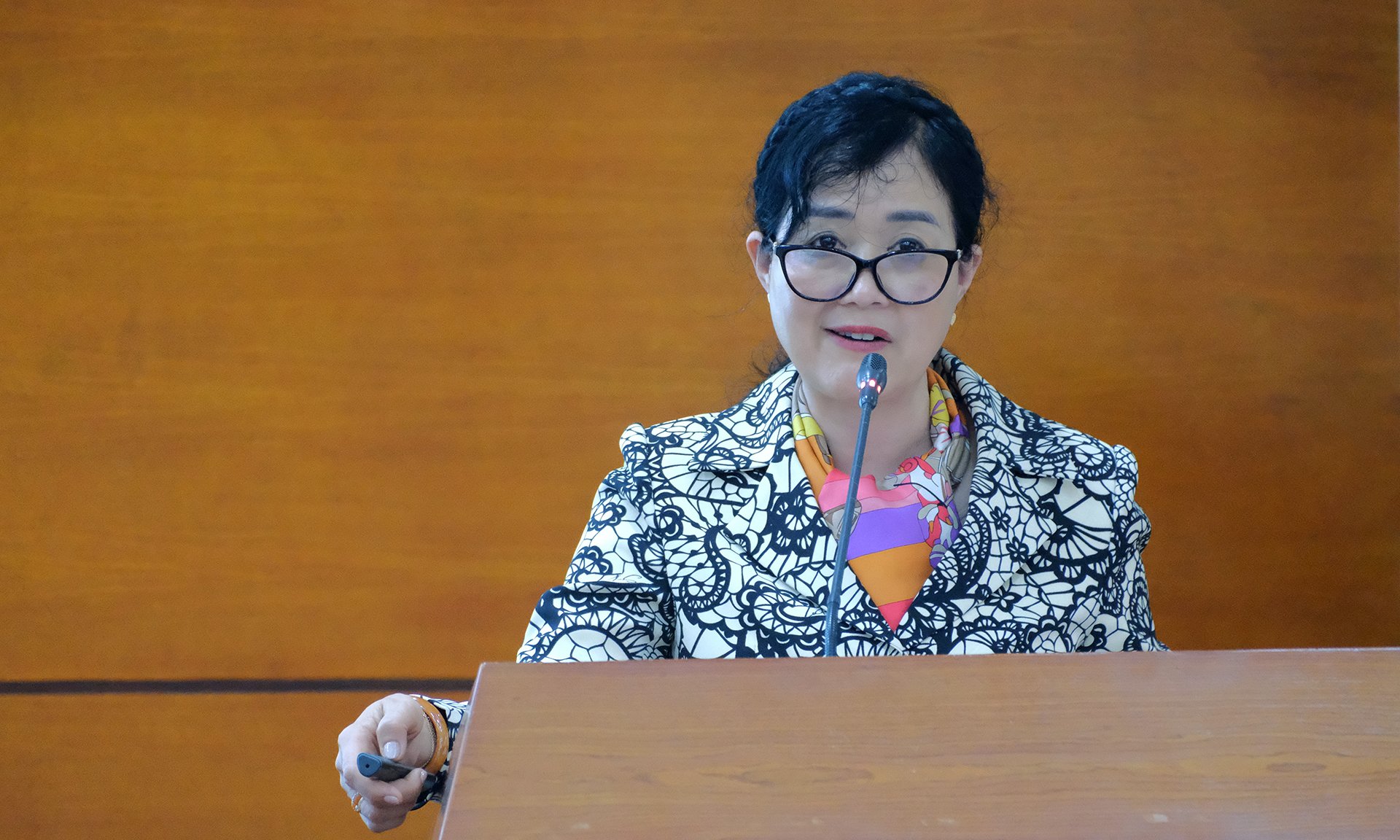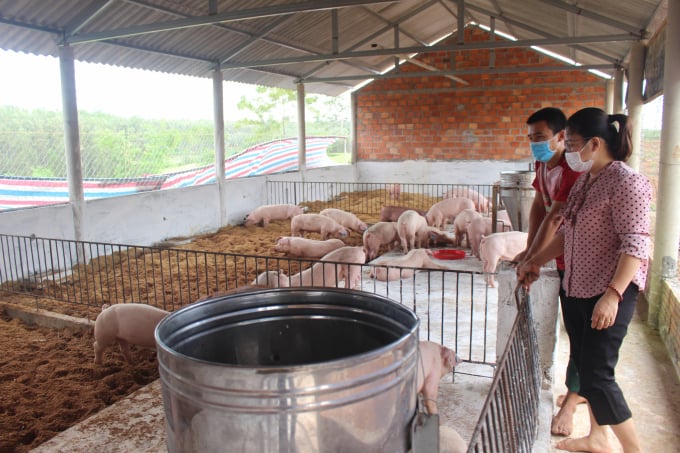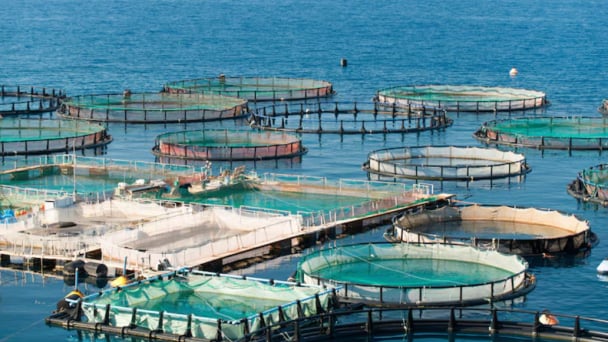June 6, 2025 | 00:27 GMT +7
June 6, 2025 | 00:27 GMT +7
Hotline: 0913.378.918
June 6, 2025 | 00:27 GMT +7
Hotline: 0913.378.918

Dr. Ha Thuy Hanh, Deputy Director of the National Center for Agricultural Extension introduced effective pig breeding models. Photo: Bao Thang.
Dr. Hanh said that agricultural extension projects on pig farming development have implemented a series of new techniques following directions from MARD Deputy Minister Phung Duc Tien to increase the content of science and technology to stimulate livestock output.
"In addition to increasing output and quality, agricultural extension models assist in the management of epidemics, particularly African Swine Fever, and in the establishment of disease-free livestock production zones," Ms. Hanh explained.
Between 2019 and 2021, NAEC applied to MARD for approval and instruction to conduct eight projects aimed at developing pig farming on a scale of thousands of heads.
NAEC's most significant project is a four-compartment tank system for waste treatment and organic fertilizer production in Hanoi, Ninh Binh, and Ha Nam. As many as 18 4-compartment tank systems are equipped with advanced biosafety measures to prevent and combat African Swine Fever. They were certified for output on the livestock wastewater index.
Apart from reducing environmental pollution, the scheme efficiently mitigates disease spread and increases farmer revenue through the use of waste to generate fertilizer.
The center's initiative also takes into account mountainous ethnic groups, assisting in the protection and restoration of several rare species. For instance, the effort in Cao Bang province to raise Huong and Ta Na pigs.
The project raises the average head/sow/year to 12.5-12.7; the maternal age for the first calving is stabilized at 321–330 days. Ms. Hanh reports that farmers are unafraid of repopulating and developing high-quality indigenous pig herds.
"By the end of 2021, 28 farming households had researched and used the model, resulting in a 2.3-fold increase in the price of indigenous pigs compared to hybrid pigs," Ms. Hanh explained.
NAEC collaborated with the FAO to issue a set of documents on "Good practices and biosecurity in small and medium-scale breeding pig farming" in 2021 and 2022. Along with organizing hundreds of ToT training courses, directing livestock farming practices by VietGAHP, biosafety farming, and so on, the agricultural extension system is committed to creating a brand and market for safe livestock.

Raising pigs according to the model of the National Agricultural Extension Center helps people prevent epidemics.
Dr. Ha Thuy Hanh has recently observed several organic pig farming models in Tuyen Quang's Yen Son district. At Mr. Bui Huy Cuong's farming home, the barn is padded with biological cushions on the ground, allowing sufficient time for pig manure to penetrate, process, and destroy harmful bacteria without producing a bad odor.
Mr. Cuong sold two batches of commercial pigs totaling more than 4 tons in 2021 at an average price of VND 80,000-120,000/kg of live pigs, approximately double the regular price.
"Development of organic farming contributes to the enhancement of the commercial product's value, the reduction of antibiotic residues, and the preservation of the breeding environment. Another advantage is that the investment is not extremely expensive but yet meets the essential biosecurity standards," Ms. Hanh explained.
Mr. Nguyen Quoc Toan, Director of Agricultural Products Processing and Development Department (Agrotrade), predicts that pig prices will be less volatile in the short term during the virtual Conference "Discussing solutions to promote the development of pig production and strengthen the management of animal feed production and business activities."
However, in the long run, live pig prices may increase for four reasons: inflationary pressure from rising costs; demand recovering thanks to the opening of tourism; breeders' hesitation to re-herd; and export interest to other countries in the area as pig prices in Thailand stay high.
Vietnam exports more pork than it did in the first months of 2021. Hong Kong is currently our country's largest market, accounting for more than 95% of total sales. Suckling pigs and young piglets are the primary export items.
Translated by Linh Linh

(VAN) Technology is redrawing the map of Vietnamese aquaculture: more modern, greener, and more sustainable.

(VAN) Novel process harnesses machine learning to reveal groups of genes that determine how efficiently plants use nitrogen.

(VAN) Several scientists and farmers are experimenting with soil treatment in some key durian-growing regions such as Cai Lay (Tien Giang), Dak Song, Gia Nghia, and Dak R’lap (Dak Nong).
/2025/05/25/4127-3-073637_820.jpg)
(VAN) Thanks to the promotion from an FAO-implemented project, vegetable production in greenhouses in Moc Chau has seen strong development, from 1.5 hectares in 2021 to nearly 50 hectares in 2024.

(VAN) FAO has recently supported USD 140,000 to implement the project 'Risk mitigation human-animal interface risks through disease control initiatives in pig farming.'

(VAN) The People's Committee of Tra Vinh province has approved an adjustment to the investment policy for the Green Hydrogen Plant project, increasing its area to approximately 52.76 hectares.
![Reducing emissions from rice fields: [2] Farmers’ commitment to the soil](https://t.ex-cdn.com/nongnghiepmoitruong.vn/608w/files/news/2025/05/05/dsc08881jpg-nongnghiep-140632.jpg)
(VAN) Clean rice cultivation model in Thuong Tan commune, Bac Tan Uyen district, is assisting local residents in achieving sustainable agriculture by substantially reducing costs, increasing productivity, and protecting the environment.